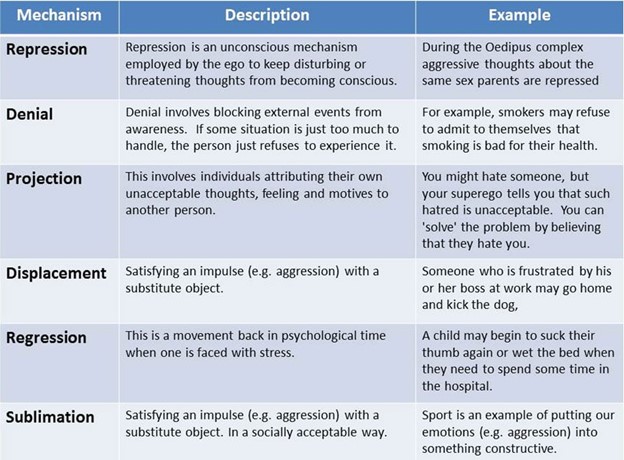A nurse at a college campus mental health counseling center is caring for a student who just failed an examination. The student spends the session berating the teacher and the course. The nurse should recognize this behavior as which of the following defense mechanisms?
Regression
Conversion
Projection
Undoing
The Correct Answer is C
A. Regression: Incorrect
Regression is a defense mechanism in which a person reverts to an earlier stage of development in response to stress or anxiety. For example, an adult might start behaving like a child when faced with a difficult situation. In this case, the student berating the teacher doesn't demonstrate a return to an earlier developmental stage, so regression is not the correct choice.
B. Conversion: Incorrect
Conversion refers to the conversion of emotional distress into physical symptoms, such as experiencing physical pain without any apparent physical cause. This mechanism is often seen in conditions like conversion disorder. The student berating the teacher is not exhibiting physical symptoms as a response to emotional distress, so conversion is not the correct choice.
C. Projection: Correct
Projection is the act of attributing one's own unacceptable feelings or thoughts to another person. In this scenario, the student is projecting their own failure onto the teacher and the course by blaming them for the failure. They are unable to accept their own role in the failure and are instead placing the blame on external factors. This aligns with the behavior described in the scenario.
D. Undoing: Incorrect
Undoing involves trying to compensate for or negate an unacceptable action or thought with a contrary action. For instance, someone who had angry thoughts might engage in excessive acts of kindness to "undo" those thoughts. The student berating the teacher is not engaging in actions to negate their negative feelings or thoughts; they are expressing their frustration directly.

Nursing Test Bank
Naxlex Comprehensive Predictor Exams
Related Questions
Correct Answer is C
Explanation
A. The partner has placed locks at the top of the doors leading to the outside:
Explanation: Placing locks at the top of doors leading outside is a safety measure to prevent the person with Alzheimer's disease from wandering or getting lost. While this does show that the partner is taking proactive steps to ensure the client's safety, it is not necessarily indicative of caregiver role strain.
B. The partner has hired a house cleaner:
Explanation: Hiring a house cleaner can be a sign of caregiver role strain. Caregivers often become overwhelmed with the responsibilities of caring for a person with Alzheimer's disease, and hiring help for household tasks can be an indication that they are finding it challenging to manage everything on their own.
C. The partner has lost 20 lb in the past 2 months:
Explanation: Rapid weight loss can be a sign of caregiver stress or burnout. The emotional and physical demands of caring for a loved one with Alzheimer's disease can lead to neglect of one's own well-being, including proper nutrition and self-care.
D. The partner redirects the client when the client is frustrated:
Explanation: While redirecting the client when they're frustrated shows that the partner is using appropriate strategies to manage challenging behaviors associated with Alzheimer's disease, this observation doesn't necessarily indicate caregiver role strain.
Correct Answer is B
Explanation
A. "Why are you feeling so down?"
This response could come across as confrontational or invasive, potentially making the client feel uncomfortable. The client has already expressed their desire not to talk at the moment, so pushing for an explanation may not be well-received.
B. "I’ll just sit here with you for a few minutes then."
Explanation:
This response shows empathy and support without pushing the client to talk or sharing personal experiences. It respects the client's desire for space and acknowledges their emotions without being intrusive. It provides a calming and non-intrusive presence, giving the client the option to open up if and when they are ready.
C. "I understand. I've felt like that before, too."
While sharing personal experiences can sometimes be helpful, in this context, it might inadvertently shift the focus from the client's emotions to the nurse's experiences. It's important to keep the focus on the client and their feelings.
D. "It might help you feel better if you talk about it."
Suggesting that talking might help is well-intentioned, but it might pressure the client into discussing their feelings when they have clearly stated their preference not to at that moment. The client's autonomy and comfort should be respected.
Whether you are a student looking to ace your exams or a practicing nurse seeking to enhance your expertise , our nursing education contents will empower you with the confidence and competence to make a difference in the lives of patients and become a respected leader in the healthcare field.
Visit Naxlex, invest in your future and unlock endless possibilities with our unparalleled nursing education contents today
Report Wrong Answer on the Current Question
Do you disagree with the answer? If yes, what is your expected answer? Explain.
Kindly be descriptive with the issue you are facing.
